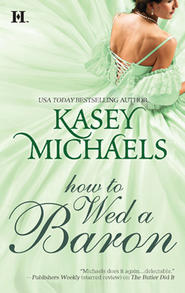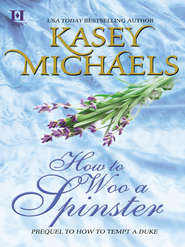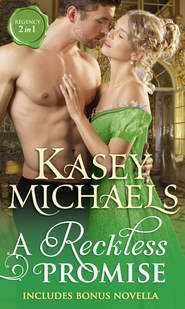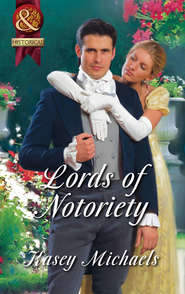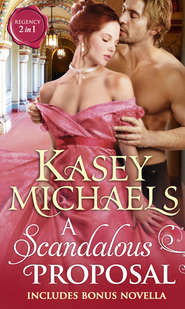По всем вопросам обращайтесь на: info@litportal.ru
(©) 2003-2025.
✖
Lords of Scandal: The Beleaguered Lord Bourne / The Enterprising Lord Edward
Настройки чтения
Размер шрифта
Высота строк
Поля
But her companions as well as the facts were against her. Only Kit, by his absence, gave her any respite, and at times she could almost find it in her heart to be in charity with the man. Almost, but not quite. After all, if not for his, as Bundy called them, “male urges,” she’d still be at home, dreaming safe dreams about the handsome knight on a white charger who would rescue her from the fire-breathing dragon and carry her off to his castle, where they would live happily ever after.
But even though he was seldom seen, the earl’s presence in Berkeley Square could not be denied. Every day after rising at the heathen hour of eleven, Kit breakfasted in his rooms, allowed himself to be dressed by Leon, who was still determined to turn a perfectly presentable Corinthian into a dashing darling of fashion, and exited the mansion, his departing form variously disappearing around the corner of the square on foot, vaulting into the seat of his new curricle and giving his horses the office to start, or bending himself into the smart town carriage that then bore him off in the regal style befitting his station—always with Jennie discreetly watching his leave-takings from behind her curtained window, happily waving him on his way. Where he went did not concern her. She was only grateful to have him gone.
Renfrew, on the other hand, had a pretty good idea of just what his lordship’s travels encompassed. Struts down Bond Street on the arms of his cronies, tours through an assortment of low taverns, forays into the world of ivory turners and cardsharps at seamy private gaming hells, hours spent in the blue room at Covent Garden negotiating an opera dancer’s current asking price for her oftsolid virtue, and an innocent prank or two aimed at livening the watch’s dull existence would all number among the earl’s activities, unless things had changed mightily since Renfrew was last in London town.
Natural high spirits and the thrill of being reunited with his boyhood friends might have explained this earnest pursuit of pleasure that nightly had Kit beating the rising sun home by less than an hour, but Renfrew knew there was another, deeper reason.
It was the dream. The dream that sent Renfrew scurrying from his warm bed on the first night of the new earl’s residence at Bourne Manor, the wicked, panic-filled dreams that tore ragged moans and hoarse screams from the sleeping man’s throat until Leon’s soothing voice could penetrate the panic and lull the tormented earl back to sleep.
Leon either did not know or would not divulge the nature of the recurring nightmare that had the earl calling the name Denny over and over again, the memory whose nocturnal reenactment moved the man to dry sobs and broken pleas for help.
The dream seemed to have disappeared, the last nightmare occurring the night before the earl’s marriage, but Renfrew knew it wasn’t so. The earl was fighting the nightmare in the only way he knew—by not falling into bed until he was either too exhausted or too deep in his cups to dream at all.
The old butler, who had served the Wilde family man and boy, could only stand back and let his master battle with his private demons, knowing the outcome but not daring to overstep his place by telling his lordship he was fighting a losing battle.
Renfrew could only watch and hope, believing the gentle child he had watched grow into the giving, compassionate young woman the earl had married was the only key to the man’s salvation. Yet Jennie and Kit might as well have been residing on separate continents for all they saw of each other. It was enough to make a stronger man than Renfrew despair. But not Renfrew—he only bided his time while making plans of his own.
As part of his project designed to invest Jennie with some passionate feelings for this particular Bourne domicile and her position as mistress of all it contained, Renfrew spent three full days acquainting her with every stick of furniture in every room of the mansion, impressing her with the history of this original painting and that priceless set of engraved silver plate.
His efforts were not in vain. Jennie was not impressed by the wealth spread out before her, but rather with the stories of the Bourne ancestors who had furnished the mansion with such care and love. That the responsibility for maintaining the beauty around her as well as placing this generation’s personal stamp on the place by way of worthy additions of art and other accessories that would reflect their times while not detracting from what had gone before was now hers was not lost on Jennie. It surprised her, though, to realize that she was more than eager to take up the challenge.
The more mundane side of running a household, neatly catalogued in a half-dozen closely written ledgers, did not inspire the same creative urges. In fact, after pretending a studious perusal of just two of the big black leather-bound books, Jennie pleaded a headache and Renfrew kindly moved the dratted things out of her sight.
“Renfrew,” Jennie proposed, once the butler had poured her a bracing cup of tea, “I’d like to strike a bargain with you. If you will consent to managing the household accounts, acting as secretary or whatever, I shall, besides offering you my eternal gratitude, undertake the hiring of the additional staff his lordship tells me we require.”
Happy to see her showing such an interest, such a willingness to involve herself, no matter how indirectly, with his lordship’s comfort, Renfrew agreed with alacrity. After all, he told himself airily, what could go wrong in the mere hiring of household staff?
And with that thought Renfrew proved yet again that, be he earl or butler, a male is still a male—never failing to underestimate the tremendous potential for disruption that churns just beneath the surface of those apparently fragile feminine forms men so condescendingly refer to as the weaker sex.
THERE WAS A GREAT DEAL of perverse satisfaction to be derived from flouting your husband’s wishes, Jennie learned as she and Goldie climbed back into the town carriage after concluding her business with the clerk in charge of placing advertisements in the Observer.
She was pleased with the wording of her advertisement—certainly the clerk had seen no reason to change so much as the placement of a single comma—and she rode home secure in the belief that this more personal form of advertising would result in bringing to her door a fair number of robust, hardworking country folk who were new to London and eager for honest work they could not find due to lack of references.
That’s what she wanted. Country folk. Plump, redcheeked farm girls and strong, raw-boned farmers’ sons who’d remind her of home. After all, what did she want with a passel of top-lofty London servants who were known far and wide for aping their masters while at the same time despising the very people who paid their wages?
She had done the right thing, she was sure of it. The fact that she had planned her trip to the newspaper office to coincide with Bundy’s monthly retreat to her couch due to a regular-as-clockwork migraine headache proved nothing to the contrary, absolutely nothing.
As they rode along the crowded street, Jennie rechecked her list. Heading it was the need for a chef—Renfrew had informed her that Kit had specifically requested a French chef—followed by notations calling for three additional footmen, two kitchen helpers, a pair of experienced stable hands, at least two more housemaids who could double at serving table, and, perhaps even a tweeny to run errands between floors if she could find one.
It seemed ostentatious to require nearly two dozen people to care for the needs and comforts of a family consisting of two young, healthy creatures who by all rights should be capable of fending for themselves.
Of course, they weren’t two average people, she amended mentally. After all, how many English couples live in eighteen-room houses containing a conservatory, two separate dining rooms, and a veritable barn of a ballroom? Bundy said the Bourne mansion was no more than a fit setting for an earl and his countess. Jennie wisely refrained from wondering aloud if this particular earl and countess didn’t look just a tad out of place in their grand surroundings—almost like children playing at being all grown up.
Kit, she had to admit, at least looked the part, having visited his tailor before traveling to Bourne Manor so that an entire new wardrobe had been waiting for him in Berkeley Square, but she knew her own simple gowns to be sadly provincial. Which was why the Bourne carriage was just then coming to a halt outside a fashionable shop in Bond Street (this part of her trip also deliberately planned around Bundy’s migraine or else Jennie knew she’d be the first countess in history to be dressed entirely in concealing white dimity gowns matched to sensible, serviceable jean boots).
Goldie was in her glory as she stood gaping and gawking throughout Jennie’s lengthy session with the modiste. A young woman of definite tastes that had previously taken second place to her budget, Jennie worked her way purposefully from one end of the selling room to the other, selecting lengths of material with an eye to color and texture and never once bothering to ask a single price.
In the space of an hour Jennie had matched the materials to sketches the delighted modiste swore on her hopes of heaven were designed with just madam countess in mind. “That exquisite waist! That so entrancing swell of bosom—so innocent, so alluring! The regal carriage of a princess, the fine molded arms of a Greek goddess. The hair of an angel, the skin of a newborn babe. Ooh la la! That the countess would deign to honor this humble establishment with her attention. I will be the making of a poor, struggling widow in a foreign land. Once madam is seen in public the ton will demand a like transformation—an impossible task, to duplicate such beauty, my lady, but one must make a living.” On and on went the modiste.
Two hours after entering the shop, Jennie departed, her head still buzzing with the Frenchwoman’s ridiculous compliments and fervent expressions of gratitude (the latter being more readily believed if Jennie had but known the total of the bill). She changed her mind about shopping for shoes, bonnets, gloves, and other accessories, putting off that errand for another day even if it meant she must listen to Bundy’s prudish criticisms of her every choice. She had a headache of her very own now, the result of the modiste’s incessant chatter and a growing hunger for her lunch, which may have accounted for her almost violent reaction to seeing her husband strolling down the opposite side of the street, a soft, clinging bit of frailty hanging from each elbow.
It was ridiculous. Why should she feel this almost overpowering urge to dash across the street and plummet the two slyly simpering creatures about the head and shoulders with her reticule? And when she had done with them she would deliver a bash or five on the noggin of the stupidly grinning ignoramus who was acting less like a married man than Prinny himself!
She stood stock-still on the flagway, rooted to the spot by her anger and her inability to do more than mentally mangle the cause of her upset.
“O-oo-o, lookee, miss,” Goldie piped up loudly at exactly the wrong moment. “There’s his lordship himself, out for a breath of air. Yoo-hoo! Your lordship!” she trilled in a high, carrying soprano, her voice succeeding in reaching the earl above the noisy street sounds and the animated chattering of his companions.
“Oh, my God!” Kit breathed in exasperation as he spied Goldie and his wife—his oddly erect wife—on the opposite side of the street. What a coil! He couldn’t abandon the two females on the crowded flagway, and he wasn’t such a gapeseed as to drag them with him and introduce them to his wife of seven days. Yet to ignore his wife entirely was courting disaster. Besides, that dratted maid would probably keep bellowing like a sick calf until he acknowledged their presence. He was damned no matter what he did!
And the Lady Luck, in the form of one Oswald Norwood, came sauntering toward him, and Kit began to believe in good fairies. “Ozzy, my dearest friend,” he intoned bravely, “would you be so kind as to escort these ladies to a hackney? I’m afraid I’ve forgotten an urgent appointment.”
Ozzy was delighted, a fact Kit did not linger to learn, hurrying instead across the street, neatly dodging horses and vehicles that dared to get in his path, to stand smartly, and just a bit breathlessly, in a direct line between his wife and his too recent companions. “I did not know you had planned to visit the shops, my dear,” he said with studied nonchalance.
Jennie leaned a bit to the left and peered over his shoulder at the females, who still stood where Kit had left them. “Obviously,” she drawled sweetly, “else you would have asked me to join your party. Wouldn’t you?”
Wretched chit! he swore silently, acting just as if we had vowed fidelity or some such rot. Which they had! he remembered with a jolt. “Party?” he improvised rapidly. “Oh, pet, you mistake the facts entirely. Those young ladies are—er—cousins of my friend Ozzy, the man with them now. I was just lending them my company while he dashed off a moment to speak with an acquaintance he hadn’t seen for some time. Merely holding the fort, as it were,” he ended with a limp laugh.
“Really?” Jennie’s voice conveyed her disbelief. “It’s a shame they had to rush off without so much as an introduction. But perhaps we can have them to dinner one evening. We know so few people in London, you know.” It was amazing how calm her voice sounded, considering she was still seriously contemplating homicide.
“Yes, well, er, you shouldn’t let the horses stand too much longer, Jennie,” Kit said in a sudden inspiration. “Allow me to escort you home, and, er, we can take luncheon together. I’ve been so busy establishing my bona fides at the banks and seeking out friends from my army days that I’m guilty of neglecting you, aren’t I, puss? I confess to feeling ashamed.”
You could charm the pennies off a dead man’s eyes, Jennie decided nastily, hating herself for feeling her outrage slowly melting under Kit’s engagingly open grin. Now her anger was somehow redirecting itself, turning away from her husband and centering on her own overreaction to seeing him in the company of two, she reluctantly acknowledged, beautiful females, when she herself didn’t care two sticks for the man personally. In fact, had Kit only promptly shepherded his wife into the coach he might have come out of the whole episode with nary a scratch, so angry was Jennie with herself. But Lady Luck had deserted him too soon this sunny spring day and the storm clouds were gathering, soon to rain all over his victory.
“Kit,” came the voice of Ozzy Norwood as he joined his friend after sending two very disgruntled ladies on their way back to Drury Lane. “I demand you return my favor and introduce me to your beautiful companion. Two for one may not be a fair exchange, but then a simple mister cannot command the same privileges as an earl, what? By the by,” he added, securing his friend’s coffin with a few finishing nails, “this one makes those two warblers look like yesterday’s kippers, stap me if they don’t. Can’t blame you for dumping them in my lap and loping off like that.”
A large rock—possibly Gibraltar itself—was lodged in Lord Bourne’s throat, making coherent speech impossible, although he did try a time or two, gasping and choking badly before subsiding into silence and glaring at his grinning friend.
Just as Ozzy’s eyes were belatedly taking in Jennie’s simple but well-cut gown and the presence of a female much resembling a lady’s maid standing in front of what looked suspiciously like Bourne’s town carriage—a small glimmer of light beginning to grow in his pleasantly vacant face—Jennie stepped into the breach and took charge.
Extending a small gloved hand in his direction, she said brightly, “You must be one of my husband’s good friends—one of those selfish creatures who so monopolize his time in lengthy sessions reminiscing about your shared youths. But I’ll forgive your interruption of our honeymoon, as I know how greatly Kit enjoys reliving his childish exploits. He must, mustn’t he, as I have not seen him above a moment or two since we arrived in town.”
“It’s all my fault!” Ozzy sacrificed bravely. “He didn’t want to be with us, you know. We fairly begged for his company. Don’t blame him, my lady, I implore you—”
Jennie pretended to pout, throwing out her full bottom lip, thereby nearly inciting her husband to violence, then brightened visibly as she said, “I have it! You must come to dine. Just as soon as our French chef is in residence—say, a week from today? And bring your two cousins, as I do so pine for some female companionship. After all, sir, any friend of Kit’s cannot help but find welcome in Berkeley Square. Isn’t that so, dear?” she asked the mute earl. Was that smoke she saw coming out of her husband’s ears? she thought, feeling rather full of herself.
“You’re kind, ma’am,” Ozzy blustered, his overtaxed intellect reeling under the barrage his faux pas had unleashed and powerless to maneuver out of range of attack. “Too—too—kind. Indeed,” he said, attempting an air of worldliness, “Kit is undeserving of such a fine lady as yourself.”
“Why thank you, sir,” Jennie responded. “I quite agree. But then we so seldom get what we deserve, don’t we?”
At last Kit found his tongue. “Oh, I don’t know about that, my love,” he put in, leading her toward the open door of the coach. “Some of us get exactly what we deserve. In fact, one of us might just get it this very night if she continues asking for it so blatantly.”
“Really?” Jennie exclaimed, bravado masking the fact that her knees were beginning to experience a decided tendency to quiver. In a much lower voice heard only by her husband she added, “My papa always warned me that people who choose to live in glass houses should beware of tossing rocks. Look to yourself, my love, before casting any stones at my behavior. Retribution can be demanded on both sides.”
After delivering this stunning coup de grace, Jennie turned, inclined her head to her husband’s friend and incidental tattletale, and allowed herself to be assisted into the carriage. Blond head held high, she concentrated on her second verbal victory over her husband and determinedly resisted any thoughts concerning her ridiculous overreaction upon seeing Kit enjoying the company of any female besides his wife—who wouldn’t cross the street with him if he asked her to, which, she owned sourly, he hadn’t.
As the carriage drove away Kit turned to his lifelong friend, ready to do murder in broad daylight while standing in the middle of crowded Bond Street. “Now, now, Kit, old chum, it was an honest mistake,” Ozzy began, hastily backing up a step. “You never told me your wife was such a looker. Anyway, wives ain’t supposed to be pretty. They’re supposed to have big dowries and buck teeth. And hatchet noses. And…and…and scrawny chests—”
“Keep your filthy mouth off my wife’s chest!” Kit was so overcome as to bluster before realizing exactly what he was saying. “Never mind that! What in thunder did you think you were about, prancing over here like some hound in heat and cadging in a tryst with my wife as if she were some trollop we’d share between us? Are your brains entirely to let that you’d mistake a lady for one of your loose women? I ought to call you out for this, Ozzy, I swear it!”






